外研版八年级英语下册 Module 10 Unit 2 It seemed that they were speaking to me in person. 课件 (共61张PPT)
文档属性
| 名称 | 外研版八年级英语下册 Module 10 Unit 2 It seemed that they were speaking to me in person. 课件 (共61张PPT) | 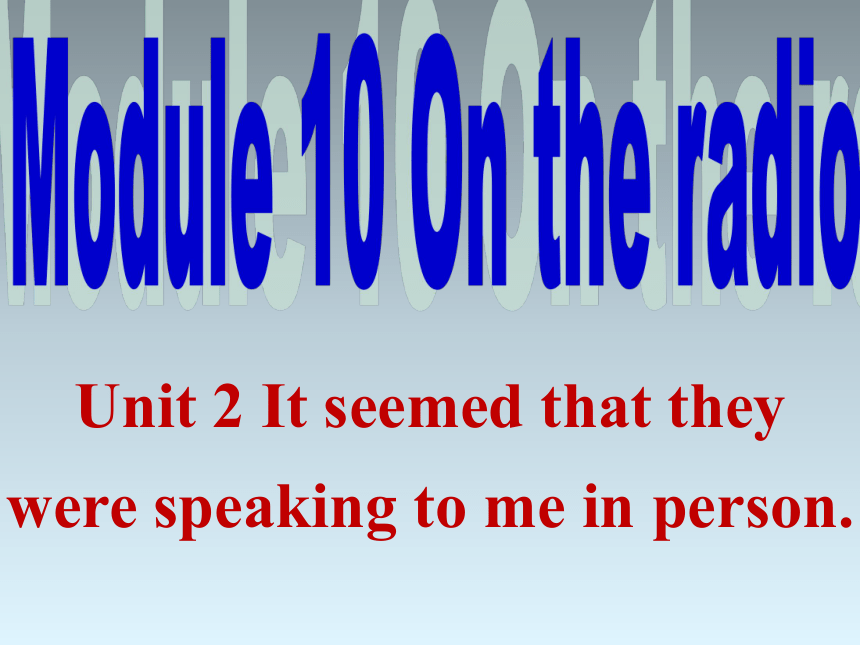 | |
| 格式 | ppt | ||
| 文件大小 | 1.8MB | ||
| 资源类型 | 教案 | ||
| 版本资源 | 外研版 | ||
| 科目 | 英语 | ||
| 更新时间 | 2022-07-21 11:18:30 | ||
图片预览

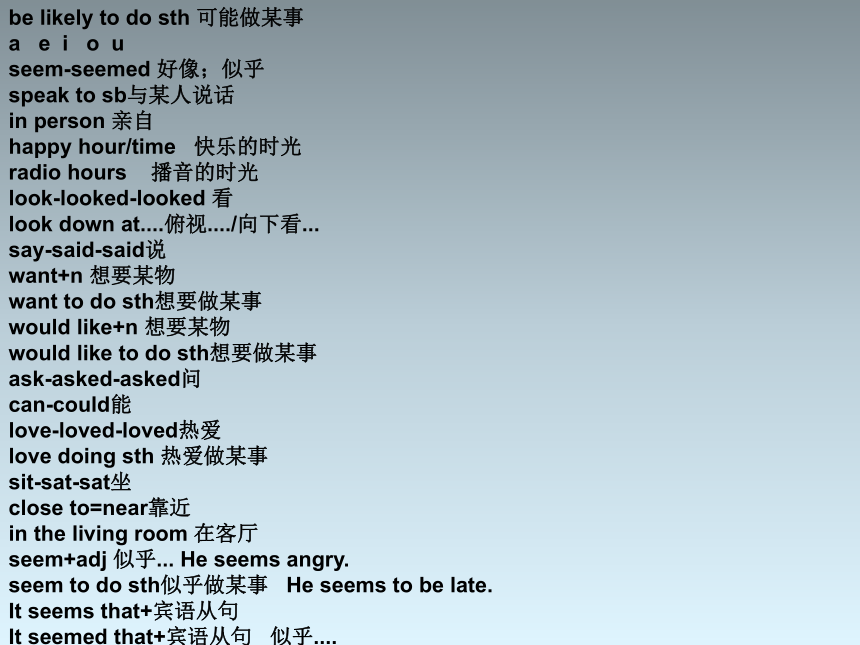
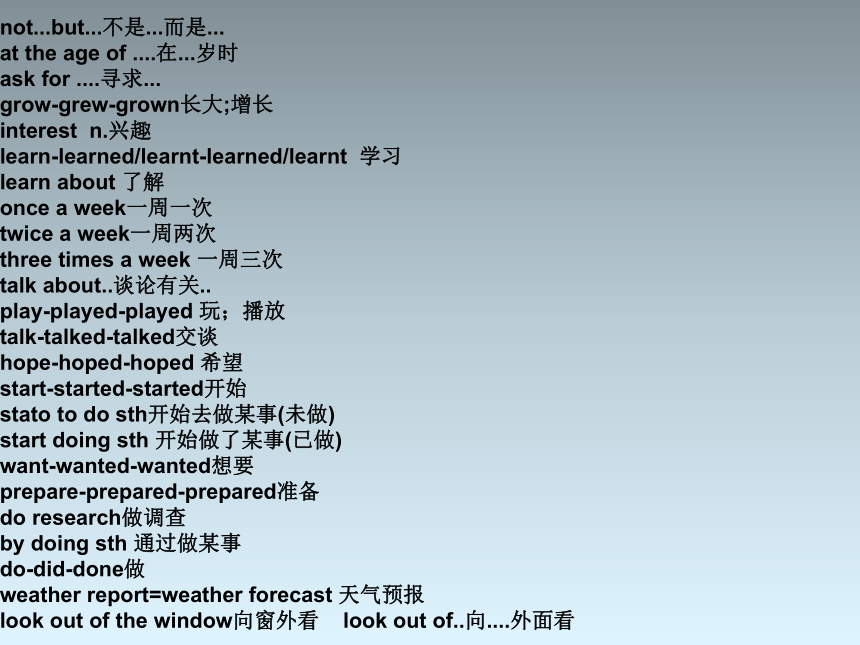

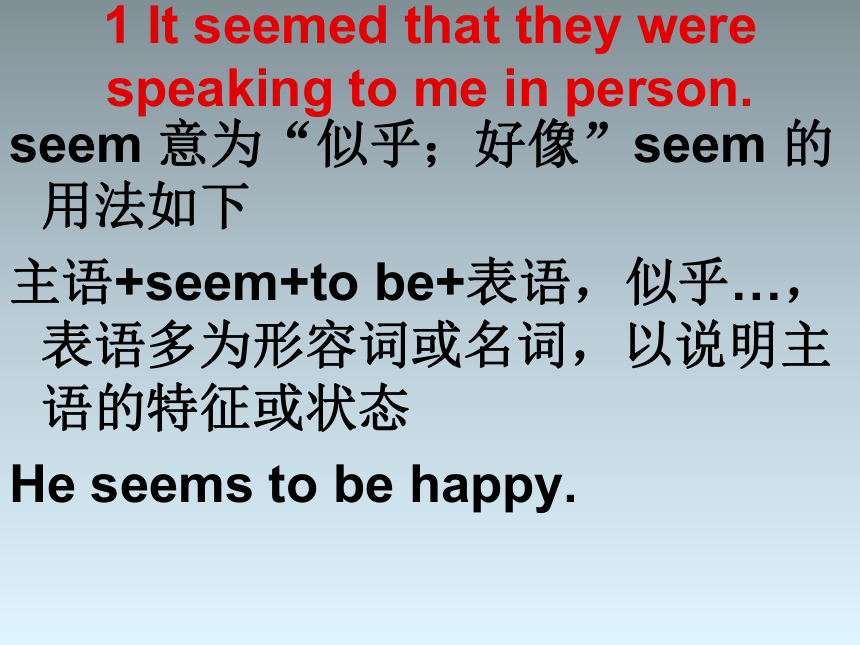
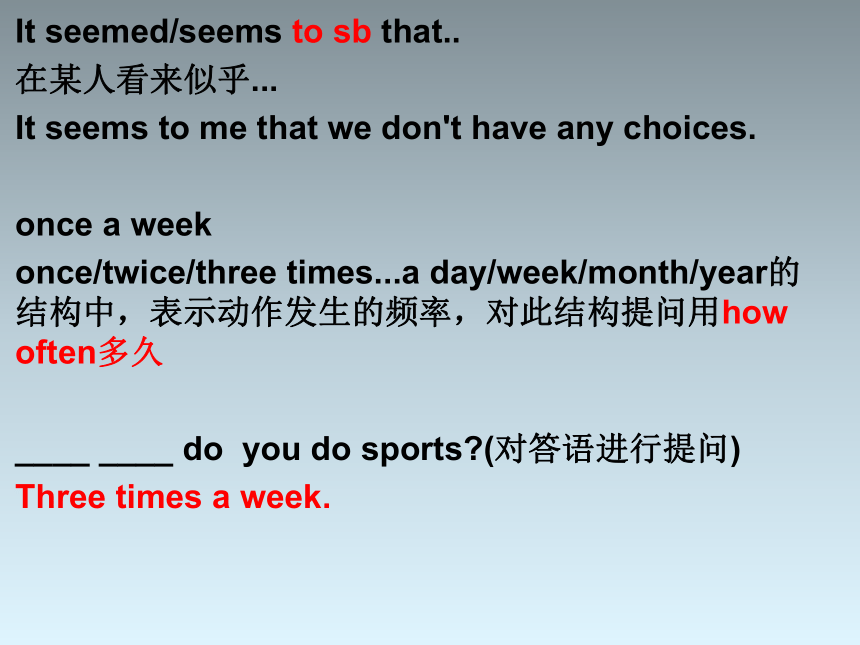
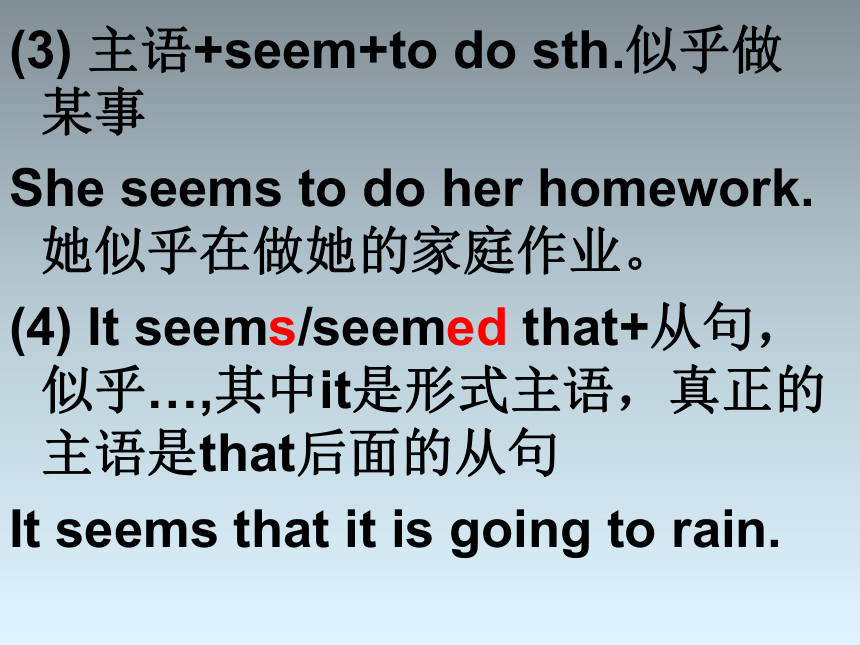
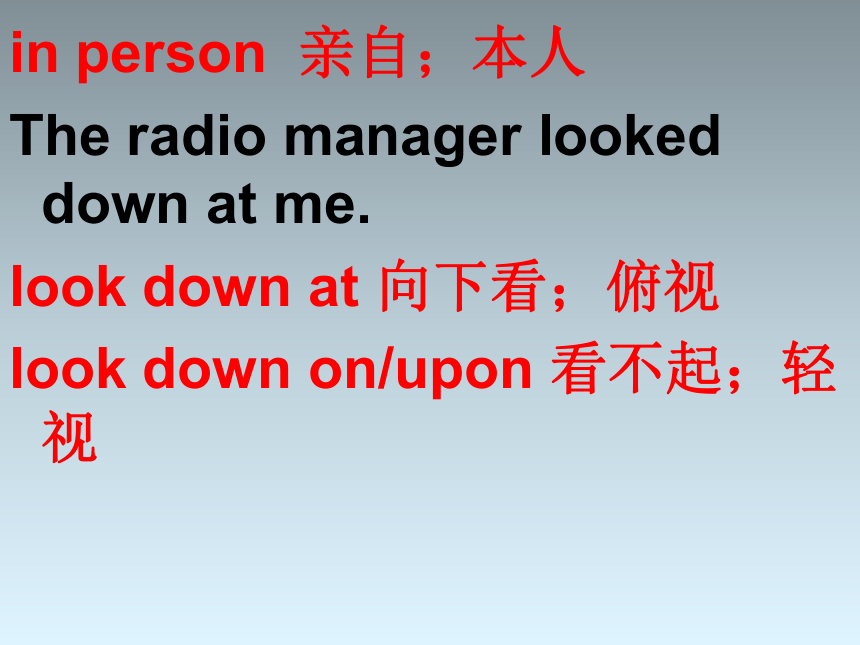
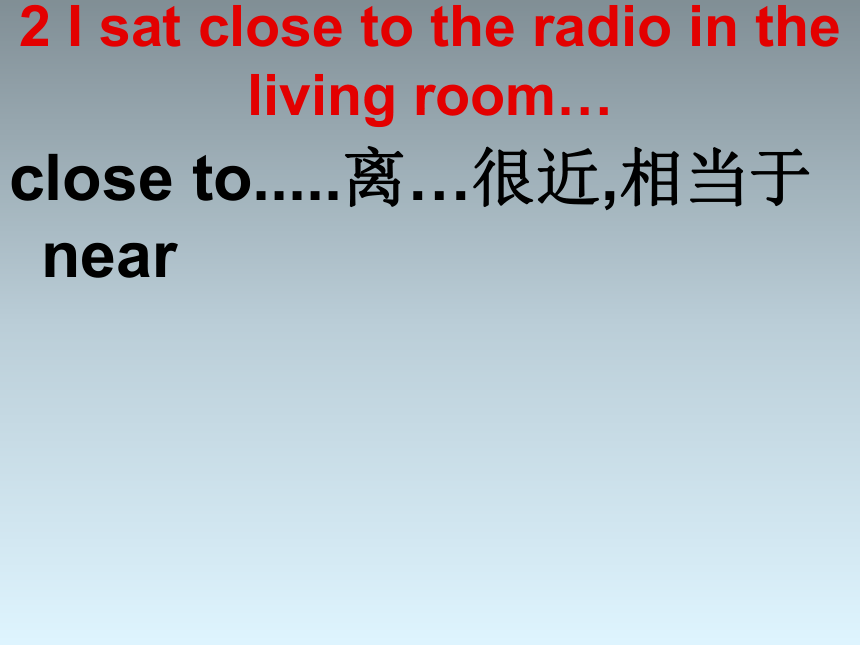
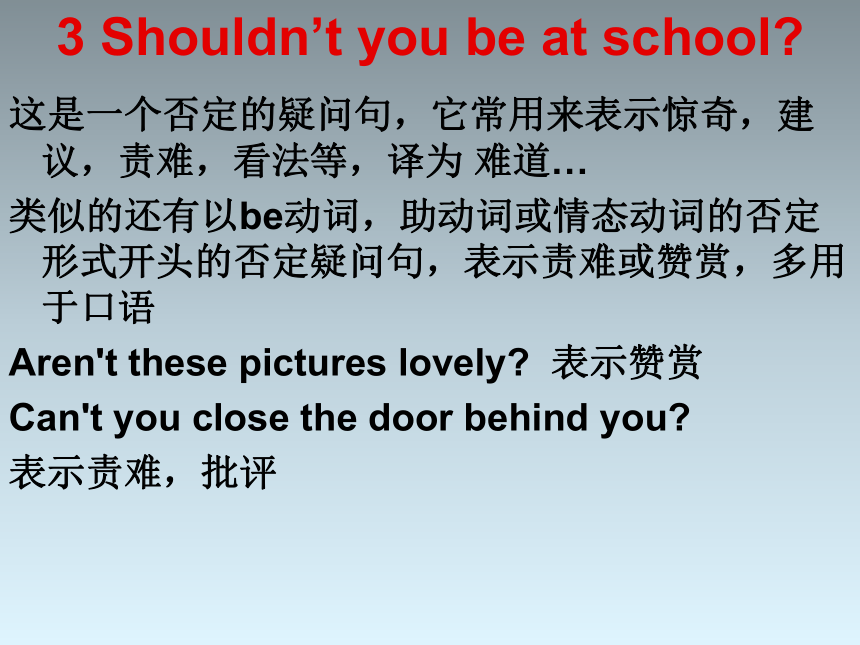
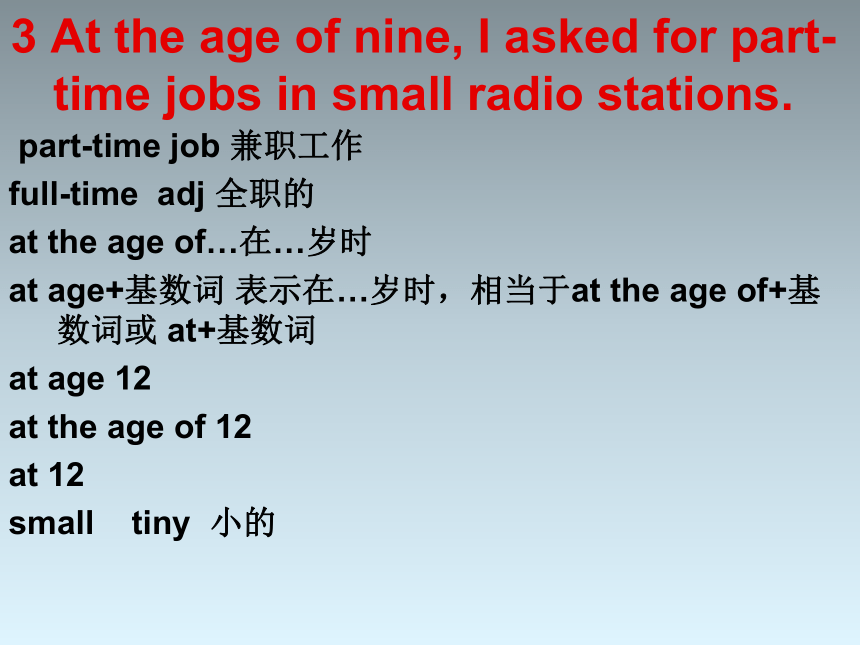
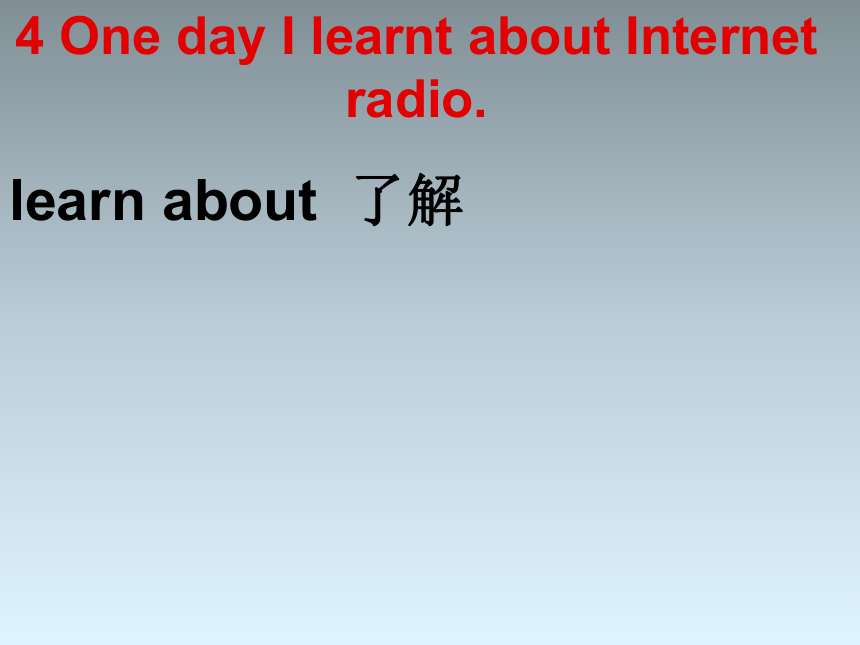
文档简介
(共61张PPT)
Unit 2 It seemed that they were speaking to me in person.
be likely to do sth 可能做某事
a e i o u
seem-seemed 好像;似乎
speak to sb与某人说话
in person 亲自
happy hour/time 快乐的时光
radio hours 播音的时光
look-looked-looked 看
look down at....俯视..../向下看...
say-said-said说
want+n 想要某物
want to do sth想要做某事
would like+n 想要某物
would like to do sth想要做某事
ask-asked-asked问
can-could能
love-loved-loved热爱
love doing sth 热爱做某事
sit-sat-sat坐
close to=near靠近
in the living room 在客厅
seem+adj 似乎... He seems angry.
seem to do sth似乎做某事 He seems to be late.
It seems that+宾语从句
It seemed that+宾语从句 似乎....
not...but...不是...而是...
at the age of ....在...岁时
ask for ....寻求...
grow-grew-grown长大;增长
interest n.兴趣
learn-learned/learnt-learned/learnt 学习
learn about 了解
once a week一周一次
twice a week一周两次
three times a week 一周三次
talk about..谈论有关..
play-played-played 玩;播放
talk-talked-talked交谈
hope-hoped-hoped 希望
start-started-started开始
stato to do sth开始去做某事(未做)
start doing sth 开始做了某事(已做)
want-wanted-wanted想要
prepare-prepared-prepared准备
do research做调查
by doing sth 通过做某事
do-did-done做
weather report=weather forecast 天气预报
look out of the window向窗外看 look out of..向....外面看
come with sb 与某人一起来
sit down坐下
have/has-had-had 有;吃;喝
need to do sth 需要做某事
begin-began-begun开始
real job 真正的工作
1 It seemed that they were speaking to me in person.
seem 意为“似乎;好像”seem 的用法如下
主语+seem+to be+表语,似乎…,表语多为形容词或名词,以说明主语的特征或状态
He seems to be happy.
It seemed/seems to sb that..
在某人看来似乎...
It seems to me that we don't have any choices.
once a week
once/twice/three times...a day/week/month/year的结构中,表示动作发生的频率,对此结构提问用how often多久
____ ____ do you do sports (对答语进行提问)
Three times a week.
(3) 主语+seem+to do sth.似乎做某事
She seems to do her homework.她似乎在做她的家庭作业。
(4) It seems/seemed that+从句,似乎…,其中it是形式主语,真正的主语是that后面的从句
It seems that it is going to rain.
in person 亲自;本人
The radio manager looked down at me.
look down at 向下看;俯视
look down on/upon 看不起;轻视
2 I sat close to the radio in the living room…
close to.....离…很近,相当于near
3 Shouldn’t you be at school
这是一个否定的疑问句,它常用来表示惊奇,建议,责难,看法等,译为 难道…
类似的还有以be动词,助动词或情态动词的否定形式开头的否定疑问句,表示责难或赞赏,多用于口语
Aren't these pictures lovely 表示赞赏
Can't you close the door behind you
表示责难,批评
3 At the age of nine, I asked for part-time jobs in small radio stations.
part-time job 兼职工作
full-time adj 全职的
at the age of…在…岁时
at age+基数词 表示在…岁时,相当于at the age of+基数词或 at+基数词
at age 12
at the age of 12
at 12
small tiny 小的
4 One day I learnt about Internet radio.
learn about 了解
5 As I grew older, my interest in radio grew.
as 连词conj. 随着….,引导时间状语从句,强调两个动作同时进行
6 It seemed that they were speaking not to lots of listeners but to me in person.
not…but..,.不是…而是…,用来连接两个并列成分,强调后者,当not..,.but…连接两个主语时,谓语动词要与but后面的主语保持一致
Not I but he likes learning English.
不是我而是他喜欢学英语。
7 The purpose is to check the sound level.
purpose n. 意图;目的
on purpose 故意的
for the purpose of…为了…
I visit Beijing for the purpose of beautiful sights.
for the purpose of doing sth.为了做某事
I visit Beijing for the purpose of enjoying beautiful sights.
Let's do a sound check.
sound n. 声音
sound v.听起来 后面接adj做其表语
The music sounds wonderful.
sound 泛指一切声响,指一切可以听到的声音
voice 指人的说话声或唱歌声
noise 噪音,可以用a, some,any,much 等词修饰,但不能用many
speech 演讲 做演讲 make a speech
1 At the (年龄) of 20, he left his hometown.
2 He seems to be angry with you.(改为同义句)
It seems that he is angry with you.
3.Tony似乎要去野餐。seem to do sth 似乎做某事
Tony seems ____ ___ ___ ___.
4 They are good .(listen)
5 I sat near my mother.(改为同义句)
I sat my mother.
6 My interest (兴趣) in English grows and I’m interested (感兴趣的) in English.
7 Not she but I (learn)English.
8.我去北京是为了享受美丽的风景。for the purpose of doing sth
I went to Beijing for the purpose of____ ____ ____ .
9. I visit my parents once a week. (对画线部分进行提问)
___ ___do you visit your parents
Hello Mr. DJ' Would you play my song Please' please' play it All night long Hello Mr. DJ On the radio Calling every station On the air Sending out the message Everywhere Tell it everybody On the radio
Let’s enjoy a song On the radio.
Oh' oh' oh Everybody' everywhere Please call the DJ on the air From Moon to Mars and everywhere Please call the DJ on the air Hello Mr. DJ I'm losing sleep Please' please' play it My knees are gettin' weak Hello Mr. DJ On the radio
If you're not gonna play it I go insane If you're not gonna say it I lose my brain So tell it everybody On the radio Oh' oh' oh Everybody' everywhere Please call the DJ on the air From Moon to Mars and everywhere Please call the DJ on the air Everybody' everywhere Please call the DJ on the air From Moon to Mars and everywhere
Please call the DJ on the air
DJ on the air Everybody' everywhere Please call the DJ on the air From Moon to Mars and everywhere Please call the DJ on the air Everybody' everywhere Please call the DJ on the air From Moon to Mars and everywhere Please call the DJ on the air Everybody' everywhere Please call the DJ on the air From Moon to Mars and everywhere Please call the DJ on the air
Is there a radio station at your school
When does the radio station start working
What kind of programme do you like best
What do you think of the radio station at school
1.What is the boy
2.Where is he
3.What’s he doing
Look at the photo and say what it shows.
He is a radio presenter.
He is in the studio.
He is reading the news.
Read the passage and decide where you are likely to see the photo.
In a book about the history of radio.
In the life story of a famous radio presenter.
In a book on how radio works.
A radio studio manager interviews the writer.
The writer liked to listen to the radio when he was four.
When the writer grew older, he lost his interest in radio.
The writer started making radio programmes with his friends at junior high school.
The writer began his work in radio when he was fifteen.
T
T
F
T
F
Listen to the passage quickly and decide true or false.
Read and complete the sentences.
The writer met _________________ in a radio station. meet-met-met遇见
The manager asked why he wanted a job _______________.
At the age of four, the writer ___________ __________________________, listening to his favourite programs.
a radio manager
in radio
sat close to
the radio in the living room
4. At the age of nine, he asked for part-time jobs in ________________________.
5. As he grew older, he learnt about _______________________.
6. This was how the writer’s ________________________ began.
small radio stations
Internet radio
first real job in radio
I’ve always loved _________. When I was ___ years old, I sat _______________, listening to my _____________________and the voices of my ___________________. At the age of nine, I ________________________in small radio stations. As I grew older, my interest in radio _______. I learnt about______________.
Retell the passage. Fill in the blanks with proper words or phrases in the passage.
the radio
4
close to the radio
favourite programmes
favourite presenters
asked for part-time jobs
grew
Internet radio
Once a week, I played my favourite music from my father’s computer and ______________ life at school, and hoped someone might be listening. Soon my friends at school __________ _______, and then they wanted to ________. The manager let me ______________________. He asked me to say _______________________.
The purpose is to _____________________. This was how my first real job in radio
________.
talked about
started to
help
do a sound check
what I had for breakfast
began
listen
check the sound level.
Complete the passage with the correct form of the words and expressions in the box.
Peter __________ to be very happy with his new job. He works in the __________ of a local radio station. He is lucky that __________ only twenty he is doing something he loves and has a real _________.
article at the age of listener
purpose seem studio
seems
studio
at the age of
purpose
Every morning when he starts work, he does a sound check and then he looks for interesting newspaper __________ to talk about on the show. The __________ can phone in打电话进来 to talk to Peter or they can send emails to ask him to play their favourite songs. At the end of the show, he closes down all the equipment设备 and goes home. close down 关闭 email n. v emailing
article at the age of listener
purpose seem studio
articles
listeners
Would you like to be a radio presenter
What kind of programme would you like to host Why
“How old are you ” the radio manager looked down at me.
“Fifteen,” I said.
And you want a job in radio Shouldn’t you be at school He asked. describing an important event in the past
I’ve always loved the radio. I still remember, when I was four years old, I sat close to the radio in the living room, listening to my favourite programmes and to the voices of my favourite presenters. giving background information
Look at the sentences from the passage.
Now find sentences in the passage which show:
important event in the past
background information
① One day I learnt about Internet radio.
② Once a week, I played my favourite music …
③ Soon my friends at school started to listen …
④ We prepared the weekly programmes …
Now find sentences which show:
Write a passage describing an important event in the past and giving background information.
Writing
I first appeared on TV at the age of thirteen. A television presenter stopped me in the street, and started to interview me …
look down at sb. 低头看某人
The boss of the company looked down at me.
这家公司的老板低头看着我。
1. The radio manager looked down at me.
look down 向下看
Look down the valley, what a magnificent view!
往山谷下看看吧, 景色那么壮丽 啊!
look down on / upon sb. 还有“看不起,轻视某人”的意思。
Don't look down on people!
别小看人!
Don't look down upon him; he's no mug.
不要小看他, 他不是个笨蛋.
Those who look down upon others are looked down upon by others.
瞧不起别人的人也被别人瞧不起.
[链 接]
explain v. 解释; 说明
Can you explain why you were late
你能解释一下你为什么迟到吗?
I didn't quite follow. Could you explain it again
我并不是十分明白,你能再解释一遍吗
Could you explain how to fill this out
请你说明一下怎样填这吗
2. How could I explain
[链 接]
explain sth. to sb. 向某人解释……
explanation n. 解释;讲解;说明
She explained her conduct to her boss.
她向老板说明了自己那种表现的原因。
The lawyer explained the new law to us.
律师向我们解释了新法律。
His explanations are always difficult to believe.
他说的总是令人难以相信。
3. When I was four years old, I sat close to the radio in my living room, listening to my favourite programmes, and to the voices of my favorite presenters.
本句中when引导的是时间状语从句,listening to my favourite programmes, and to the voices of my favorite presenters在句中作状语,表示伴随状况。
my favourite programmes和the voice of my favorite presenters是listening to后面两个并列的宾语。and后面省略了listening。
4. It seemed that they were speaking … in person.
seem v. 似乎
He seems (to be) quite happy.
他似乎很开心。
如用于否定句,可否定seem,也可否定不定式。如:
She didn’t seem to enjoy herself at the party.
= She seemed not to enjoy herself at the party.
她似乎在聚会上玩得不愉快。
It seemed that ... 看起来似乎……
It seems that there will be heavy rain soon.
好像马上要下大雨了。
It seemed that our teacher was pleased with me about it.
关于这件事我的老师似乎对我很满意。
[链 接]
[拓展]
seem, look这两个词一般用作半系动词,都可以译作“似乎”或“看上去”。
seem所表示的“似乎”或“看来”是以客观的迹象为依据的。
look所表示的“看来”是以视觉所接受的印象为依据的。
in person 亲身,亲自
I’ll go to the meeting in person.
我将亲自赴会。
You may apply for tickets in person or by letter.
需要票者可亲自来申请亦可来信索取.
He will be present at the meeting in person.
他将亲自参加会议.
sound n. 声音
I hear the sound of the birds every night.
每天晚上我都听到鸟叫声。
I hope I never hear that sound again.
我希望我再也不会听到那种声音。
5. Let’s do a sound check.
[链 接]
sound v. “听起来”, 相当于系动词be, 后面接形容词作它的表语。
That sounds good.
那听起来不错。
[辨析] sound, voice, noise
sound 泛指一切声响,指一切可以听到的声音。sound还可以用作动词,表示“听起来”,后面跟形容词作表语。sound like表示“听起来像……”,后面跟名词。
voice 表示“嗓音”,指人的说话声或唱歌声
noise 噪音,吵闹声,常具有贬义,表示令人心烦的不和谐的“嘈杂声,噪音,响声”。可以用a, some, any, much等词修饰,但不用many修饰。
1. Don’t make any ________, children.
2. _________ travels slower than light.
3. There’s so much ______ in this room that I can’t hear you talking.
4. They were shouting at the top of their ___________.
5. He spoke in a very loud _________.
noise
Sound
noise
voices
voice
Practice
6. Don’t make a _________. The baby’s asleep.
7. Does this sentence _________ right
8. The little girl has a very beautiful and sweet _________.
9. I can hear the _________ of the bells outside.
10. The music _________ too loud.
noise
sound
voice
sound
sounds
6. … purpose is to check the sound level.
purpose n.目的,意图
1) 表示做某事的目的,通常用 the purpose of 的结构。如:
What was the purpose of his visit
他来访的目的是什么
He came here with [for] the purpose of seeing his family.
他来这里的目的是探亲。
若 purpose 前用了物主代词,则通常连用介词 in。如:
What is your purpose in being here
你在这儿干什么
Her purpose in going to Japan is to look for her uncle.
她去日本的目的是找她叔叔。
以下结构也用介词 in。如:
I have a purpose in making this trip to Europe.
我这次欧洲之行是有目的的。
2) 表示为了某种目的,通常用 for … purposes (其中的 purpose通常用复数)。如:
He keeps a horse for pleasure purposes.
他为消遣而养马。
He learns Japanese for business purposes.
他学习日语是为做生意。
类似的例子有:for medical purposes (为了医学的目的),for scientific purposes (为了科学的目的),English for commercial purposes (商业英语)等。
3) 用于 on purpose, 意为“有意地;故意地”。如:
I came here on purpose to see you.
我是特意来看你的。
She broke the dish on purpose just to show her anger.
她故意打破碟子以表示她的愤怒。
I. 根据句意和提示完成单词,使句子语法正确,意义通顺。 1. We p__________ (准备) a programme once a week.
2. I want you to ________ (解释) the reason to me.
3. He ________ (看起来) to be very old.
4. Dr Brown has written an ________ (文章) for the newspaper.
repared
explain
seems
article
II. 根据下列句子的汉语意思和英文提示, 完成句子。
1. 我从山顶上看下面的城市。
______________________ from the top of the mountain.
2. 他向老师寻求帮助。
He _______________ from his teacher.
3. 似乎他们不喜欢这部电影。
_______________ they didn’t like the film.
I look down at the city
asks for help
It seemed that
4. 上课时, 她时不时往窗外看。
When she is having classes, she ___________ the window from time to time.
5. 所有的播音员在开始前都要回答同样的问题,目的是检查音质水平。
___________________ need to answer the same question before they begin work; the _________ is to check the sound level.
looks out of
All radio presenters
purpose
Unit 2 It seemed that they were speaking to me in person.
be likely to do sth 可能做某事
a e i o u
seem-seemed 好像;似乎
speak to sb与某人说话
in person 亲自
happy hour/time 快乐的时光
radio hours 播音的时光
look-looked-looked 看
look down at....俯视..../向下看...
say-said-said说
want+n 想要某物
want to do sth想要做某事
would like+n 想要某物
would like to do sth想要做某事
ask-asked-asked问
can-could能
love-loved-loved热爱
love doing sth 热爱做某事
sit-sat-sat坐
close to=near靠近
in the living room 在客厅
seem+adj 似乎... He seems angry.
seem to do sth似乎做某事 He seems to be late.
It seems that+宾语从句
It seemed that+宾语从句 似乎....
not...but...不是...而是...
at the age of ....在...岁时
ask for ....寻求...
grow-grew-grown长大;增长
interest n.兴趣
learn-learned/learnt-learned/learnt 学习
learn about 了解
once a week一周一次
twice a week一周两次
three times a week 一周三次
talk about..谈论有关..
play-played-played 玩;播放
talk-talked-talked交谈
hope-hoped-hoped 希望
start-started-started开始
stato to do sth开始去做某事(未做)
start doing sth 开始做了某事(已做)
want-wanted-wanted想要
prepare-prepared-prepared准备
do research做调查
by doing sth 通过做某事
do-did-done做
weather report=weather forecast 天气预报
look out of the window向窗外看 look out of..向....外面看
come with sb 与某人一起来
sit down坐下
have/has-had-had 有;吃;喝
need to do sth 需要做某事
begin-began-begun开始
real job 真正的工作
1 It seemed that they were speaking to me in person.
seem 意为“似乎;好像”seem 的用法如下
主语+seem+to be+表语,似乎…,表语多为形容词或名词,以说明主语的特征或状态
He seems to be happy.
It seemed/seems to sb that..
在某人看来似乎...
It seems to me that we don't have any choices.
once a week
once/twice/three times...a day/week/month/year的结构中,表示动作发生的频率,对此结构提问用how often多久
____ ____ do you do sports (对答语进行提问)
Three times a week.
(3) 主语+seem+to do sth.似乎做某事
She seems to do her homework.她似乎在做她的家庭作业。
(4) It seems/seemed that+从句,似乎…,其中it是形式主语,真正的主语是that后面的从句
It seems that it is going to rain.
in person 亲自;本人
The radio manager looked down at me.
look down at 向下看;俯视
look down on/upon 看不起;轻视
2 I sat close to the radio in the living room…
close to.....离…很近,相当于near
3 Shouldn’t you be at school
这是一个否定的疑问句,它常用来表示惊奇,建议,责难,看法等,译为 难道…
类似的还有以be动词,助动词或情态动词的否定形式开头的否定疑问句,表示责难或赞赏,多用于口语
Aren't these pictures lovely 表示赞赏
Can't you close the door behind you
表示责难,批评
3 At the age of nine, I asked for part-time jobs in small radio stations.
part-time job 兼职工作
full-time adj 全职的
at the age of…在…岁时
at age+基数词 表示在…岁时,相当于at the age of+基数词或 at+基数词
at age 12
at the age of 12
at 12
small tiny 小的
4 One day I learnt about Internet radio.
learn about 了解
5 As I grew older, my interest in radio grew.
as 连词conj. 随着….,引导时间状语从句,强调两个动作同时进行
6 It seemed that they were speaking not to lots of listeners but to me in person.
not…but..,.不是…而是…,用来连接两个并列成分,强调后者,当not..,.but…连接两个主语时,谓语动词要与but后面的主语保持一致
Not I but he likes learning English.
不是我而是他喜欢学英语。
7 The purpose is to check the sound level.
purpose n. 意图;目的
on purpose 故意的
for the purpose of…为了…
I visit Beijing for the purpose of beautiful sights.
for the purpose of doing sth.为了做某事
I visit Beijing for the purpose of enjoying beautiful sights.
Let's do a sound check.
sound n. 声音
sound v.听起来 后面接adj做其表语
The music sounds wonderful.
sound 泛指一切声响,指一切可以听到的声音
voice 指人的说话声或唱歌声
noise 噪音,可以用a, some,any,much 等词修饰,但不能用many
speech 演讲 做演讲 make a speech
1 At the (年龄) of 20, he left his hometown.
2 He seems to be angry with you.(改为同义句)
It seems that he is angry with you.
3.Tony似乎要去野餐。seem to do sth 似乎做某事
Tony seems ____ ___ ___ ___.
4 They are good .(listen)
5 I sat near my mother.(改为同义句)
I sat my mother.
6 My interest (兴趣) in English grows and I’m interested (感兴趣的) in English.
7 Not she but I (learn)English.
8.我去北京是为了享受美丽的风景。for the purpose of doing sth
I went to Beijing for the purpose of____ ____ ____ .
9. I visit my parents once a week. (对画线部分进行提问)
___ ___do you visit your parents
Hello Mr. DJ' Would you play my song Please' please' play it All night long Hello Mr. DJ On the radio Calling every station On the air Sending out the message Everywhere Tell it everybody On the radio
Let’s enjoy a song On the radio.
Oh' oh' oh Everybody' everywhere Please call the DJ on the air From Moon to Mars and everywhere Please call the DJ on the air Hello Mr. DJ I'm losing sleep Please' please' play it My knees are gettin' weak Hello Mr. DJ On the radio
If you're not gonna play it I go insane If you're not gonna say it I lose my brain So tell it everybody On the radio Oh' oh' oh Everybody' everywhere Please call the DJ on the air From Moon to Mars and everywhere Please call the DJ on the air Everybody' everywhere Please call the DJ on the air From Moon to Mars and everywhere
Please call the DJ on the air
DJ on the air Everybody' everywhere Please call the DJ on the air From Moon to Mars and everywhere Please call the DJ on the air Everybody' everywhere Please call the DJ on the air From Moon to Mars and everywhere Please call the DJ on the air Everybody' everywhere Please call the DJ on the air From Moon to Mars and everywhere Please call the DJ on the air
Is there a radio station at your school
When does the radio station start working
What kind of programme do you like best
What do you think of the radio station at school
1.What is the boy
2.Where is he
3.What’s he doing
Look at the photo and say what it shows.
He is a radio presenter.
He is in the studio.
He is reading the news.
Read the passage and decide where you are likely to see the photo.
In a book about the history of radio.
In the life story of a famous radio presenter.
In a book on how radio works.
A radio studio manager interviews the writer.
The writer liked to listen to the radio when he was four.
When the writer grew older, he lost his interest in radio.
The writer started making radio programmes with his friends at junior high school.
The writer began his work in radio when he was fifteen.
T
T
F
T
F
Listen to the passage quickly and decide true or false.
Read and complete the sentences.
The writer met _________________ in a radio station. meet-met-met遇见
The manager asked why he wanted a job _______________.
At the age of four, the writer ___________ __________________________, listening to his favourite programs.
a radio manager
in radio
sat close to
the radio in the living room
4. At the age of nine, he asked for part-time jobs in ________________________.
5. As he grew older, he learnt about _______________________.
6. This was how the writer’s ________________________ began.
small radio stations
Internet radio
first real job in radio
I’ve always loved _________. When I was ___ years old, I sat _______________, listening to my _____________________and the voices of my ___________________. At the age of nine, I ________________________in small radio stations. As I grew older, my interest in radio _______. I learnt about______________.
Retell the passage. Fill in the blanks with proper words or phrases in the passage.
the radio
4
close to the radio
favourite programmes
favourite presenters
asked for part-time jobs
grew
Internet radio
Once a week, I played my favourite music from my father’s computer and ______________ life at school, and hoped someone might be listening. Soon my friends at school __________ _______, and then they wanted to ________. The manager let me ______________________. He asked me to say _______________________.
The purpose is to _____________________. This was how my first real job in radio
________.
talked about
started to
help
do a sound check
what I had for breakfast
began
listen
check the sound level.
Complete the passage with the correct form of the words and expressions in the box.
Peter __________ to be very happy with his new job. He works in the __________ of a local radio station. He is lucky that __________ only twenty he is doing something he loves and has a real _________.
article at the age of listener
purpose seem studio
seems
studio
at the age of
purpose
Every morning when he starts work, he does a sound check and then he looks for interesting newspaper __________ to talk about on the show. The __________ can phone in打电话进来 to talk to Peter or they can send emails to ask him to play their favourite songs. At the end of the show, he closes down all the equipment设备 and goes home. close down 关闭 email n. v emailing
article at the age of listener
purpose seem studio
articles
listeners
Would you like to be a radio presenter
What kind of programme would you like to host Why
“How old are you ” the radio manager looked down at me.
“Fifteen,” I said.
And you want a job in radio Shouldn’t you be at school He asked. describing an important event in the past
I’ve always loved the radio. I still remember, when I was four years old, I sat close to the radio in the living room, listening to my favourite programmes and to the voices of my favourite presenters. giving background information
Look at the sentences from the passage.
Now find sentences in the passage which show:
important event in the past
background information
① One day I learnt about Internet radio.
② Once a week, I played my favourite music …
③ Soon my friends at school started to listen …
④ We prepared the weekly programmes …
Now find sentences which show:
Write a passage describing an important event in the past and giving background information.
Writing
I first appeared on TV at the age of thirteen. A television presenter stopped me in the street, and started to interview me …
look down at sb. 低头看某人
The boss of the company looked down at me.
这家公司的老板低头看着我。
1. The radio manager looked down at me.
look down 向下看
Look down the valley, what a magnificent view!
往山谷下看看吧, 景色那么壮丽 啊!
look down on / upon sb. 还有“看不起,轻视某人”的意思。
Don't look down on people!
别小看人!
Don't look down upon him; he's no mug.
不要小看他, 他不是个笨蛋.
Those who look down upon others are looked down upon by others.
瞧不起别人的人也被别人瞧不起.
[链 接]
explain v. 解释; 说明
Can you explain why you were late
你能解释一下你为什么迟到吗?
I didn't quite follow. Could you explain it again
我并不是十分明白,你能再解释一遍吗
Could you explain how to fill this out
请你说明一下怎样填这吗
2. How could I explain
[链 接]
explain sth. to sb. 向某人解释……
explanation n. 解释;讲解;说明
She explained her conduct to her boss.
她向老板说明了自己那种表现的原因。
The lawyer explained the new law to us.
律师向我们解释了新法律。
His explanations are always difficult to believe.
他说的总是令人难以相信。
3. When I was four years old, I sat close to the radio in my living room, listening to my favourite programmes, and to the voices of my favorite presenters.
本句中when引导的是时间状语从句,listening to my favourite programmes, and to the voices of my favorite presenters在句中作状语,表示伴随状况。
my favourite programmes和the voice of my favorite presenters是listening to后面两个并列的宾语。and后面省略了listening。
4. It seemed that they were speaking … in person.
seem v. 似乎
He seems (to be) quite happy.
他似乎很开心。
如用于否定句,可否定seem,也可否定不定式。如:
She didn’t seem to enjoy herself at the party.
= She seemed not to enjoy herself at the party.
她似乎在聚会上玩得不愉快。
It seemed that ... 看起来似乎……
It seems that there will be heavy rain soon.
好像马上要下大雨了。
It seemed that our teacher was pleased with me about it.
关于这件事我的老师似乎对我很满意。
[链 接]
[拓展]
seem, look这两个词一般用作半系动词,都可以译作“似乎”或“看上去”。
seem所表示的“似乎”或“看来”是以客观的迹象为依据的。
look所表示的“看来”是以视觉所接受的印象为依据的。
in person 亲身,亲自
I’ll go to the meeting in person.
我将亲自赴会。
You may apply for tickets in person or by letter.
需要票者可亲自来申请亦可来信索取.
He will be present at the meeting in person.
他将亲自参加会议.
sound n. 声音
I hear the sound of the birds every night.
每天晚上我都听到鸟叫声。
I hope I never hear that sound again.
我希望我再也不会听到那种声音。
5. Let’s do a sound check.
[链 接]
sound v. “听起来”, 相当于系动词be, 后面接形容词作它的表语。
That sounds good.
那听起来不错。
[辨析] sound, voice, noise
sound 泛指一切声响,指一切可以听到的声音。sound还可以用作动词,表示“听起来”,后面跟形容词作表语。sound like表示“听起来像……”,后面跟名词。
voice 表示“嗓音”,指人的说话声或唱歌声
noise 噪音,吵闹声,常具有贬义,表示令人心烦的不和谐的“嘈杂声,噪音,响声”。可以用a, some, any, much等词修饰,但不用many修饰。
1. Don’t make any ________, children.
2. _________ travels slower than light.
3. There’s so much ______ in this room that I can’t hear you talking.
4. They were shouting at the top of their ___________.
5. He spoke in a very loud _________.
noise
Sound
noise
voices
voice
Practice
6. Don’t make a _________. The baby’s asleep.
7. Does this sentence _________ right
8. The little girl has a very beautiful and sweet _________.
9. I can hear the _________ of the bells outside.
10. The music _________ too loud.
noise
sound
voice
sound
sounds
6. … purpose is to check the sound level.
purpose n.目的,意图
1) 表示做某事的目的,通常用 the purpose of 的结构。如:
What was the purpose of his visit
他来访的目的是什么
He came here with [for] the purpose of seeing his family.
他来这里的目的是探亲。
若 purpose 前用了物主代词,则通常连用介词 in。如:
What is your purpose in being here
你在这儿干什么
Her purpose in going to Japan is to look for her uncle.
她去日本的目的是找她叔叔。
以下结构也用介词 in。如:
I have a purpose in making this trip to Europe.
我这次欧洲之行是有目的的。
2) 表示为了某种目的,通常用 for … purposes (其中的 purpose通常用复数)。如:
He keeps a horse for pleasure purposes.
他为消遣而养马。
He learns Japanese for business purposes.
他学习日语是为做生意。
类似的例子有:for medical purposes (为了医学的目的),for scientific purposes (为了科学的目的),English for commercial purposes (商业英语)等。
3) 用于 on purpose, 意为“有意地;故意地”。如:
I came here on purpose to see you.
我是特意来看你的。
She broke the dish on purpose just to show her anger.
她故意打破碟子以表示她的愤怒。
I. 根据句意和提示完成单词,使句子语法正确,意义通顺。 1. We p__________ (准备) a programme once a week.
2. I want you to ________ (解释) the reason to me.
3. He ________ (看起来) to be very old.
4. Dr Brown has written an ________ (文章) for the newspaper.
repared
explain
seems
article
II. 根据下列句子的汉语意思和英文提示, 完成句子。
1. 我从山顶上看下面的城市。
______________________ from the top of the mountain.
2. 他向老师寻求帮助。
He _______________ from his teacher.
3. 似乎他们不喜欢这部电影。
_______________ they didn’t like the film.
I look down at the city
asks for help
It seemed that
4. 上课时, 她时不时往窗外看。
When she is having classes, she ___________ the window from time to time.
5. 所有的播音员在开始前都要回答同样的问题,目的是检查音质水平。
___________________ need to answer the same question before they begin work; the _________ is to check the sound level.
looks out of
All radio presenters
purpose
同课章节目录
- Module 1 Feelings and impressions
- Unit 1 It smells delicious.
- Unit 2 I feel nervous when I speak Chinese .
- Unit 3 Language in use
- Module 2 Experiences
- Unit 1 I've also entered lots of speaking competi
- Unit 2 They have seen the Pyramids.
- Unit 3 Language in use
- Module 3 Journey to space
- Unit 1 Has it arrived yet?
- Unit 2 We have not found life on any other planet
- Unit 3 Language in use
- Module 4 Seeing the docto
- Unit 1 I haven't done much exercise since I got m
- Unit 2 We have played football for a year now
- Unit 3 Language in use
- Module 5 Cartoons
- Unit 1 It's time to watch a cartoon.
- Unit 2 Tintin has been popular for over eighty yea
- Unit 3 Language in use
- Revision module A
- Module 6 Hobbies
- Unit 1 Do you collect anything ?
- Unit 2 Hobbies can make you grow as a person.
- Unit 3 Language in use
- Module 7 Summer in Los Angeles
- Unit 1 Please write to me and send me some photos
- Unit 2 Fill out a form and come to learn English
- Unit 3 Language in use
- Module 8 Time off
- Unit 1 I can hardly believe we are in the city ce
- Unit 2 We thought somebody was moving about
- Unit 3 Language in use
- Module 9 Friendship
- Unit 1 Could I ask if you've mentioned this to he
- Unit 2 I believe that the world is what you think
- Unit 3 Language in use
- Module 10 On the radio
- Unit 1 I hope that you can join us one day
- Unit 2 It seemed that they were speaking to me in
- Unit 3 Language in use
- Revision module B
